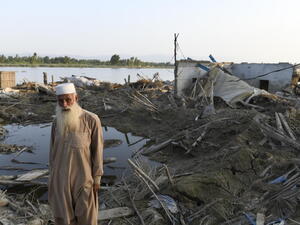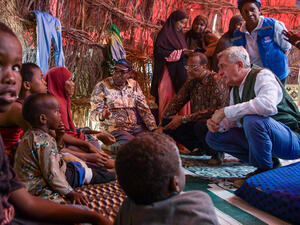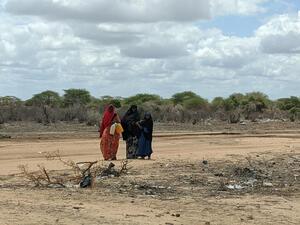Afghans: Pakistan movements, Tajikistan fears
Afghans: Pakistan movements, Tajikistan fears
Afghan refugees fleeing civil war and severe drought in northern Afghanistan continue to arrive in Pakistan at a rate of 200 to 250 a day. UNHCR is moving newly arrived Afghan refugees out of the Jalozai transit camp, south-west of Peshawar, where seven children have reportedly died during a cold spell. By the end of today, some 2,000 refugees should be transferred to New Shamshatoo II refugee camp, 24 km away. All 18,000 refugees should be transferred by the end of the week. Temperatures are dipping below freezing in the rugged border region, and the new arrivals must be quickly moved to New Shamshatoo II, where water supplies, latrines, shelters, and other facilities are being constructed.
More than 60,000 new Afghan refugees fled to Pakistan in the last four months of 2000. In addition to the Jalozai site that currently shelters 18,000, another 12,000 new arrivals are at Akora Khattak, 50 km east of Peshawar. New Shamshatoo I refugee site shelters some 30,000 Afghans, while some 6,000 refugees from the first half of 2000 are in Baluchistan.
About 75 percent of Pakistan's new arrivals are minority groups, mainly Tajiks and Uzbeks fleeing the fighting between the Taleban and the Northern Alliance forces in the north of the country. Some 25 percent are ethnic Pashtuns. UNHCR cares for some 1.2 million Afghan refugees in Pakistan, while the government estimates that another 2 million Afghans live in Pakistan's urban centres.
Internal displacement is a growing problem inside Afghanistan, with some 80,000 displaced reported in Herat, 70,000 reported in Badakhshan and still others reported in Mazar e Sharif. They are fleeing the drought as well as the civil conflict.
UNHCR remains extremely concerned about the fate of some 10,000 Afghans, mostly women and children, who have been stuck for weeks on a string of islands on the river Pyandj separating Afghanistan from Tajikistan. The people have not received any substantial aid in weeks. The islands have also come under sporadic shelling. Tajikistan has so far refused to allow them in, despite UNHCR's interventions. UNHCR is disappointed with the government's position, which we only know from the media since UNHCR's request to allow the Afghans in has not been formally answered despite the fact that Tajikistan is a signatory to the 1951 refugee Convention.









